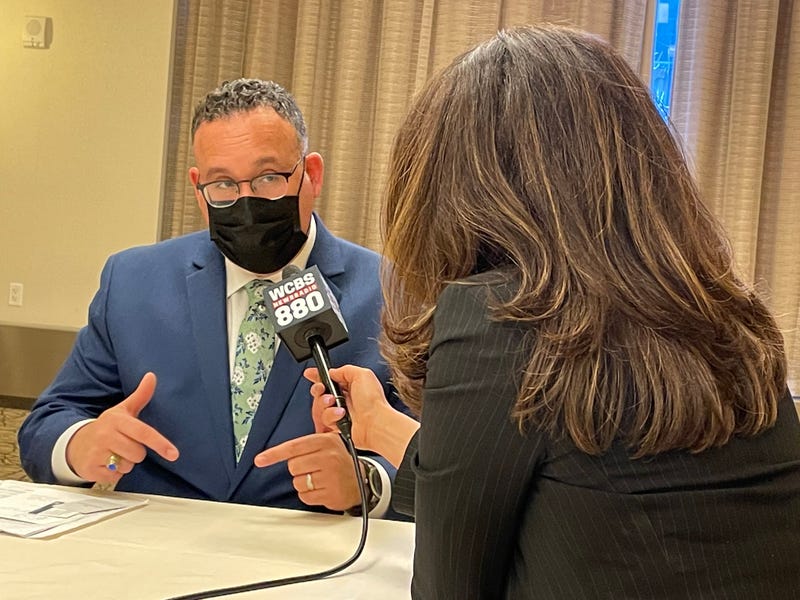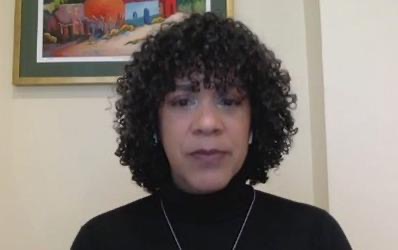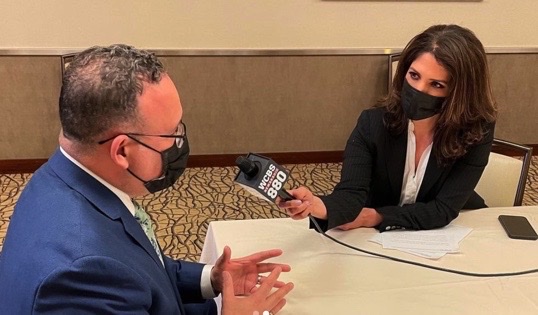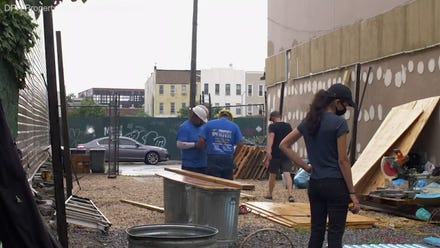
Lee Brice: Garth Brooks is my hero | Kurt's Country
Neil A. Carousso produces NewsNation original “Kurt’s Country” – a celebration of country music and a slice of Americana with host Kurt Bardella.
-
WATCH: One-on-One with NYC Mayoral Candidate Dianne Morales
Post Views: 671By Lynda Lopez, WCBS Newsradio 880
NEW YORK (WCBS 880) — New Yorkers will have their first experience with ranked choice voting in the June 22nd Democratic primary.
City residents may rank their top five mayoral candidates and this week the Working Families Party chose their top three progressives: Scott Stringer, Dianne Morales and Maya Wiley — in that order.
Anchor Lynda Lopez spoke with Morales for this week’s 880 Weekly Rewind, which airs Fridays at 7 PM, and asked her what the endorsement means to her campaign.
“My campaign has actually been focused on centering and elevating the voices of some of the most vulnerable New Yorkers and I think that getting this sort of nod from the Working Families Party is an acknowledgment that we have actually been very effective in doing that,” Morales said. “My campaign is also a very non-traditional campaign and it was not expected to actually get this far, so I think that it’s a great affirmation and attestation to what we’ve done and I’m very proud of that.”
Morales helped open the Office of Youth Development while working at the city’s Department of Education from 2002 to 2004.
Since then, she led several non-profits that focused on youth development. Morales had been executive director of the Phipps Neighborhoods for a decade, helping families in low-income communities in the South Bronx overcome poverty, when she decided to run for mayor.
Her priorities include reforming the city housing authority, building affordable housing, and providing a guaranteed minimum income.
Morales, who spent decades leading local non-profits in low-income communities, fears the coronavirus pandemic is far from over.
In the wide-ranging interview, she told Lopez that her job as mayor would be to implement a more proactive approach to crises like the pandemic, noting the inequities in those suffering the most.
“I think it is true that COVID-19 just further exacerbated and exposed the pandemics of inequality and racism. We had for too long, from an investment perspective, focused on reacting on the backend rather than preventing things,” Morales said. “We should have paid people to stay home early on so that we could actually get the pandemic under control and people didn’t have to feel like they had to risk their lives in order to provide for their families, and we should’ve protected those people who we knew we needed to actually keep things going, both in terms of the PPE and prioritization in terms of vaccination. I still think those things are relevant today because I don’t think we’re in the clear from the COVID-19 pandemic at all, so I think that’s what we need to be focusing on.”
In terms of vaccine rollout, Morales said the city should look at prioritizing communities that have been hit the hardest and working to remove the barriers preventing access to technology and the portals to sign up for an appointment.
“It should be easy to access, there should be a combination of advance appointments and walk-in opportunities, there should be a mobile unit on your corner so you can access that,” Morales said.
Morales is running for mayor on a platform of slashing the NYPD budget by $3 billion and reallocating those funds to community-based organizations to address quality-of-life crimes.
If elected, Morales would be the city’s first Afro-Latino mayor and she notes the national reckoning on race is at the heart of campaign.
She said the calls for racial justice in the wake of the police shooting of Daunte Wright and killing of George Floyd is a priority.
“I’m so tired of marching for our lives,” Morales said. “And I think we need to be able to actually act in a whole different kind of way.”
Morales said the majority of cases that police respond to are not actual crimes in progress, but involve issues of mental health, housing and substance abuse and the response should be catered to address those needs.
“I’ve called for the creation of a Community First Responders Department that would instead be staffed by professionals or staff that are skilled and trained in intervention and de-escalation, and who would act as a part of a broader ecosystem of human service providers and community-based organizations to connect people to what they need,” Morales said. “Right now, we have someone with a mental health crisis, a man with a gun responds and the best case scenario, that person gets locked up overnight and released the next day back to the very same situation and in the worst case scenario they get shot and killed. My proposal is that we actually have trained professionals respond to that and then connect that person to services so that we can actually help improve their lives.”
Morales said her goal is to reclaim the definition of public safety.
“It’s not policing. Police don’t prevent crime, they respond to crime, and even then don’t do so necessarily well and we need to provide our communities with the resources that they really need to be safe. It’s housing, it’s jobs, it’s food and it’s health care. Those are the things that communities need,” Morales said.
She said her proposal is about divesting from police to invest in the people.
“Reallocating those funds to the types of services and programs that we know actually help to create increased security and comfort and dignity for people and in turn translate into safety,” Morales said. “Ultimately, I think we all benefit from that. Everybody wants to live in a safe community. If we’ve learned nothing over the course of the last 12 months it’s that my safety is linked to my neighbor’s safety.”
https://omny.fm/shows/880-weekly-rewind/crime-on-the-rise-in-nyc-the-floyd-trial-nears-anHear comprehensive analysis of the top stories of the week and original reporting on The 880 Weekly Rewind hosted by Lynda Lopez Friday nights at 7 PM on WCBS-AM New York. Listen to this week’s full show, produced by Neil A. Carousso, on the media player above.
-
Small Business Spotlight: Pandemic Uncertainty Fuels Suburban Housing Shortage
Post Views: 682By Joe Connolly and Neil A. Carousso
WCBS 880 (NEW YORK) — The housing market has flipped upside down.
As people grow accustomed to new living habits, their housing needs have changed.
Alison Bernstein, founder of The Suburban Jungle Group, owns proprietary software that helps families develop a “home search strategy,” focusing on the neighborhood rather than the housing transaction.
“I think this whole pandemic and the way that we live and the way that we look at life has really shown that thinking about, objectively, all of your options is transforming the way you purchase real estate,” Bernstein said on the WCBS Small Business Spotlight, sponsored by Dime Community Bank.
She started the company in 2004 shortly after having her first child when she was considering moving out of the city to New York’s suburbs to raise her family.
In her home search, she realized there are three bedroom homes everywhere, but only one neighborhood that best suits each family.
“You want to understand, specifically, the community before you get into the home purchase,” said Bernstein.
Her employees are trained to be objective advisors to find the right community fit for each family depending on their lifestyle. For example, The Suburban Jungle Group would recommend a town on Long Island with Little League teams for a family with a young boy who’s interested in baseball. They partner with local agents to make the home purchase.
People are resetting their priorities and Bernstein believes they’re catching onto the flexibility of remote work, which has enabled The Suburban Jungle Group to grow, attract and retain talent, and expand nationally. They recently opened offices in Denver, Philadelphia and South Florida.
“The other piece of it is never having a written out business plan because I always explain to people that your business changes every day and I think where some of these businesses really got stuck when the world changed so quickly (is) they kept going back to this plan,” she said, adding, “You have to be quick and nimble.”
Bernstein told WCBS 880’s Joe Connolly and Neil A. Carousso the housing market is in a bit of a “holding pattern” right now because people are unsure if they will return to the office five days a week, work on a hybrid schedule or stay fully remote as the COVID-19 pandemic extends past a year.
“Right now, all across the board, specifically in the New York market, we’re facing an inventory issue outside of the city and a lot of that has really been driven by sort of the weirdness of the dynamic,” she explained. “This back to work is a big question. There are so many thoughts on what that’s going to look like and nobody really knows and that’s going to be a key determinant in terms of what’s happening in the market.”
The real estate veteran said there’s a lack of housing inventory in the suburbs nationwide, noting people used to live close to where they work, but commuting distance may be outdated for some workers in the post-pandemic economy.
“The home has been completely redefined,” Bernstein said. “Not only is it a place where you sleep, but now, you’re working, you’re schooling, you’re shopping, you’re eating, you’re exercising, so everything about the home is different. And so, now people’s take on home and where they want to be is also very different.”
See the new trends in the real estate market as people’s living habits and needs have changed on the WCBS Small Business Spotlight video above.
-
Education Secretary on getting kids back in school: ‘We need to go 5 days as quickly as possible’
Post Views: 663By Lynda Lopez, WCBS Newsradio 880
NEW YORK (WCBS 880) — Recently-confirmed U.S Education Secretary Miguel Cardona made his second visit to the Tri-State area this week.
The former Connecticut public school teacher and education commissioner met with New York City Schools Chancellor Meisha Ross Porter ahead of her announcement Thursday to increase the threshold for COVID-related school closures.
Under new guidance, the city’s public schools will close for 10 days when there are four or more new COVID-19 cases within a week, rather than just two cases.
Cardona told anchor Lynda Lopez for the 880 Weekly Rewind that New York City public schools have a smart strategy to begin to address the learning loss that has happened at disproportionate rates in communities of color.
“The impact of the pandemic for our Black and Brown students or students with disabilities has been significant so we have to make sure that as we’re thinking about reopening, we pay particular attention to how to help those students regain whatever was lost and really make sure that when they come back they’re coming back to a system that looks different than what it did before,” Cardona said. “It’s a very low bar if we say we want to go back to how school was before. So we have to set the bar higher and we have to make sure that the programming that we have… are aimed at those students who the pandemic affected most. We have to be very intentional about that, we have to be unapologetic about that, and we have to be bold to say some communities were hurt more than others. We have to make sure we’re taking care of those communities.”
Cardona said it is a priority to get as many students back in classrooms full-time as soon as possible and as safely as possible, but he cautions that it’s not a one-size-fit-all approach across the nation as COVID-19 cases and hospitalizations rise in the northeast and upper Midwest.
“We need to have a level of urgency like we’ve never had to get students in five days a week, but as you know one size does not fit all,” Cardona said. “Not all schools are the same in terms of safety, in terms of ventilation, or not all communities feel as comfortable, or are as vaccinated, and the COVID rates obviously have a lot to do with their level of comfort.”
For Cardona, the key is maintaining mitigation strategies, such as mask wearing, to clear a path for reopening schools.
INTERVIEW: @SecCardona talks #NYC schools, challenges of COVID, and getting kids back in the classroom.
— WCBS 880 (@wcbs880) April 9, 2021
"We need to go five days as quickly as possible. Our kids deserve it. They're waiting for us. We need to to act," he tells @LyndaLopez08.
Listen: https://t.co/jQySDZKwyJ pic.twitter.com/YeDr1KVMRh“I see across the country people getting a little comfortable taking off their masks. That’s going to lead to school closings,” he said. “We need to make sure we’re following those mitigation strategies and in schools we need to make sure we’re communicating with all stakeholders so that everybody’s on the same page. Every day that passes is a wasted opportunity for a student to engage with a friend, with a teacher and learn. So we need to have a high level of urgency and we cannot be satisfied with two days a week, that’s not enough. We need to go five days as quickly as possible. Our kids deserve it. They’re waiting for us. We need to to act.”
As schools focus on reopening, Cardona sees this moment as an opportunity to hit the reset button on a slew of issues that he hopes will fix the education system.
“There’s tremendous opportunity here,” Cardona said. “Yes, we are coming back from something that created trauma for everyone, and we have to heal together, but we’re going to learn, and we’re going to grow together and we have an opportunity to really move education in a direction that it hasn’t moved and at a pace that it hasn’t moved in the past. Our students deserve it, they’ve been sitting at home, many of them, for a whole year, and it’s really, for me, an opportunity to lead at a time when our country needed it most.”

U.S. Eduction Secretary Miguel Cardona with WCBS 880 anchor Lynda Lopez. Photo credit: Peter Haskell. Achievement disparities and improving pathways to career options are among the issues he’d like to address.
“My role as commissioner of education in Connecticut over this past year really cemented a strategy that I think is necessary in order for our kids to achieve their potential and that is working together with colleagues, different stakeholders, making sure that we have people’s different voices at the table early so it’s a shared purpose and a shared strategy to improve the outcomes for all students,” Cardona said. “During the pandemic, we were forced to problem solve together, and we didn’t always agree with all the stakeholders that were around the table, but we listened to different perspectives.”
Cardona said as the country comes out of the pandemic it’s important to run with that collaboraticve strategy to build better opportunities for all students.
A $130 billion investment in the American Rescue Plan to invest in schools and the long-term recovery process will go a long way in improving the country’s education system, beyond just turning on the lights, buying new filters and purchasing face masks, Cardona said.
“It means making sure that our schools are equipped with social, emotional supports that our students and staff are going to need for the next several years, it’s ensuring that we have wraparound services, it’s ensuring that we have good summer learning opportunities for students,” Cardona said. “It’s about giving them rich experiences with relationships so that students can grow and really reengage in schools. We have to heal together and again the American Rescue Plan provides funds for, not only making sure schools are safe, but making sure that the schools that we prepare for our students in the future are better than the schools that they left last March.”
https://omny.fm/shows/880-weekly-rewind/digging-into-the-ny-budget-covid-travel-and-our-siHear comprehensive analysis of the top stories of the week and original reporting on The 880 Weekly Rewind hosted by Lynda Lopez Friday nights at 7 PM on WCBS-AM New York. Listen to this week’s full show, produced by Neil A. Carousso, on the media player above.
-
Small Business Spotlight: Brooklyn Entrepreneur Scales Property Maintenance Business to New Heights
Post Views: 789By Joe Connolly and Neil A. Carousso
NEW YORK (WCBS 880) — This entrepreneur is coming into his own.
Anthony Finkel grew up in Ditmas Park, Brooklyn where he developed an appointment-based snow removal service in 2013. He cleaned up, literally.
“That first snowfall, I got a bunch of phone calls. They called us again that next time, and when that first winter was up, they started asking us, ‘Hey, can you paint my porch, can you clean out my garage, can you fix my deck?'” he told Joe Connolly and Neil A. Carousso on the WCBS Small Business Spotlight, sponsored by Dime Community Bank.
Finkel met their needs and expanded his offerings at DPH Property Maintenance Service. When the pandemic hit, demand surged.
U.S. home improvement projects and repairs grew more than 3 percent last year to nearly $420 billion, according to a report from Harvard University’s Joint Center for Housing Studies.
Finkel reaped the benefits, telling WCBS 880 demand has remained high over the past year and it’s picking up this spring.
“They’re home, they’re not going to the office as much, and now, they’re converting that extra room that might have had clutter in it,” he explained. “Now, they want to clean it out, they want to re-paint it and they want to turn it into their home office or their studio space.”
People are investing in their homes and personal space while many companies look to implement hybrid work schedules when they can bring workers back to the office with COVID-19 safety measures in place. Some employees may never return to the office.
Finkel is renovating corporate spaces, too. He says it’s a “mixed bag” among his clients who plan to work from home long-term and those who will go back to their office.
He had six employees pre-pandemic and has hired four more to keep up with rising demand. He hopes to double the number of workers in the next 12 months if he can double subscriptions to his home and garbage clean-up service from 50 city dwellers to 100.
“When you understand the scope of the work that you’re doing and the quality, and you’re able to bring high quality, it makes it a little bit easier to stand by your pricing and stand by your ask because you know what you’re going to bring to the table, Finkel said. “When people hire DPH, they’re getting dependability, reliability, high quality service and no-nonsense.”
He told Connolly and Carousso customer service and quality has been the key for DPH Property Maintenance Service’s growth not volume, emphasizing research as the foundation of his home improvement work.
“It’s not about how fast, but it’s how precise,” Finkel explained. “You don’t want to have to go back and re-fix things that you thought were done before.”
See how this small business is scaling quickly and meeting demand on the WCBS Small Business Spotlight video above.
-
NJ Veterans Group Rebuilds Sandy-Destroyed Housing as Homelessness Crisis Worsens in Pandemic
Post Views: 729By Neil A. Carousso
NEW JERSEY (WCBS 880) — It’s been nearly a decade since Superstorm Sandy rocked the Tri-State, but a veterans organization is still trying to rebuild while the COVID-19 pandemic compounds the homelessness issue at the heart of its mission.
There are nearly 600 homeless veterans in New Jersey – a jump of 7.99 percent from 2019 to 2020, according to the U.S. Housing and Urban Development’s Annual Homelessness Assessment Report.
The American Legion Post 107 is hoping to reduce the number of homeless vets in Hudson County, estimated to be 70, by about a third next year when it anticipates phase II of its post-Sandy rebuild will be complete.
“Our objective is to take homeless veterans off the street,” said Post 107 Commander John Carey.
Phase I of rebuilding the Veterans Center of Hoboken took six veterans off the streets into fully-furnished apartments. Phase II will add 18 studios and six single-bedroom apartments to house 24 of our nation’s heroes. The organization hopes to break ground this summer for completion next year.
“Our apartments are furnished from everything from a toothbrush to a microwave oven,” said Carey who stressed this as the differentiating factor between the Veterans Center of Hoboken and other grassroots organizations that provide shelter for veterans – sometimes without even a mattress.
“These men, like myself, we served our country and for whatever reason they have a major problem right now, we need to service that problem,” said Carey who was drafted by the U.S. Army in 1965 and served two years in Thailand and Vietnam.
The Post Commander described his service as the “FedEx for Vietnam,” telling WCBS 880’s Neil A. Carousso, “We delivered everything from a bullet to a plane to Vietnam.”
Today, Carey is leading the non-profit effort to support his peers. It’s heartbreaking for him to walk by homeless vets on nearly every bench he passes along the Hudson River.
“The word homeless should never be used with the word veteran,” he emphasized.
The Veterans Center of Hoboken has provided meals, clothes and emotional support, virtually, during the pandemic.
“They’re out of the shelters because they can’t crowd in the shelters so they’re really all over the place,” Commander Carey explained. “We bring them food, clothing, we have a veterans closet where we bring them clothes.”
Carey told WCBS 880 he believes mental illness is at the root cause of the veterans homelessness issue and housing is a step for healing their wounds and providing dignity for those who bravely served the country.
“We will have an office there where we’re going to work with the VA. They’re going to have a counseling person there every day,” he said.
American Legion Post 107 has raised about $2 million from the community for the project.
They need roughly $3.75 million more to put Phase II over the finish line in the next 18 months. You can read more about the project and donate here.











